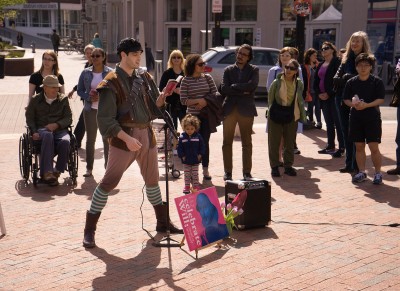
William Shakespeare, renowned playwright and poet, died on April 23, 1616. Four hundred years later, a large crowd gathered Saturday in Harvard Square to read aloud all 154 of Shakespeare’s sonnets in honor of his life and literary legacy.
The English playwright’s influence is widespread and has impacted modern culture in more than just his native country, evidenced by the Shakespeare-themed performances and events worldwide this weekend. Shakespeare is best known for his stage works, including the classic love story “Romeo and Juliet” and the revenge story “Hamlet.”
Saturday’s “sonnet slam” was organized by Nike Tirman, a long-time admirer of Shakespeare who has worked as a script supervisor for film and television for years. The event explored Shakespeare’s poetry instead of his well-known plays.
“I just think that Shakespeare is an incredible human being and has brought so much to our world for so long,” Tirman said.
The day began with a performance by the Boston-based Willow Flute Ensemble, which set the tone for the event with light-hearted and Renaissance-inspired pieces. The small ensemble included Boston University’s Professor Philip Trackman, who plays the alto flute.
“I’ve been playing since I was in the fifth grade,” Trackman said. “I’m in my 60s now, so it’s been a long time.”
After the performance, Shakespeare’s Sonnet I kicked off the poetry marathon. Some participants registered for a specific sonnet online, while others volunteered the day of the event.
The readers were young and old alike, and some read their sonnets in other languages, including French, Spanish and Polish.
Sam Schwartz, a sponsored programs analyst for Harvard University, organized the lineup of readers throughout the day.
“Organizing this event has been a good excuse to get familiar with the sonnets in a way that I hadn’t been,” Schwartz said.
Each reader was given a copy of the complete Shakespeare sonnet collection to take home. The sonnets had very personal meanings for several audience members, including Debra Wise, the artistic director of Underground Railway Theater in Cambridge.
When Wise’s parents were young, her father, Gilbert, gave her mother a copy of his high school photo with “Sonnet 61 — Gilbert” inscribed on the back.
Wise’s mother did not even look up the poem when the two were married, and it was only while preparing for her mother’s 90th birthday celebration that the poem was finally read. Wise’s daughter, who graduated from BU’s College of Fine Arts in 2013, wrote and framed the sonnet for her grandmother the following Christmas.
“[Shakespeare’s] work expresses vividly to me how expansive the human soul can be,” Wise wrote in an email. “His work has brought me, and continues to bring me great joy — and I love feeling connected to him, as a professional theater-maker working day to day.”
While Shakespeare’s plays are often performed live, it is rare in comparison for his sonnets to be read aloud for large public audiences. Christian Krenek, 26, earned his master’s degree in theater from Tufts University and currently works at the Reagle Music Theatre in Waltham. The Medford resident volunteered to read several sonnets.
“I love the idea of a live Shakespearian performance,” Krenek said. “I think one of the problems is that people think, ‘Oh, Shakespeare has to be read,’ but when you hear it spoken and you hear the poetry, you hear the verse, you hear the meter. It suddenly makes a lot more sense once it’s spoken aloud.”
Krenek said he believes the messages within the sonnets, especially the themes of love and fate, are as relevant today as they were in 1616.
“The messages are timeless,” Krenek said. “Of course it’s going to be relevant. It’s going to be relevant another hundred years from now — 500, 600 years from now. It doesn’t matter. Because as long as there are people around, we’re going to need these.”



















































































































